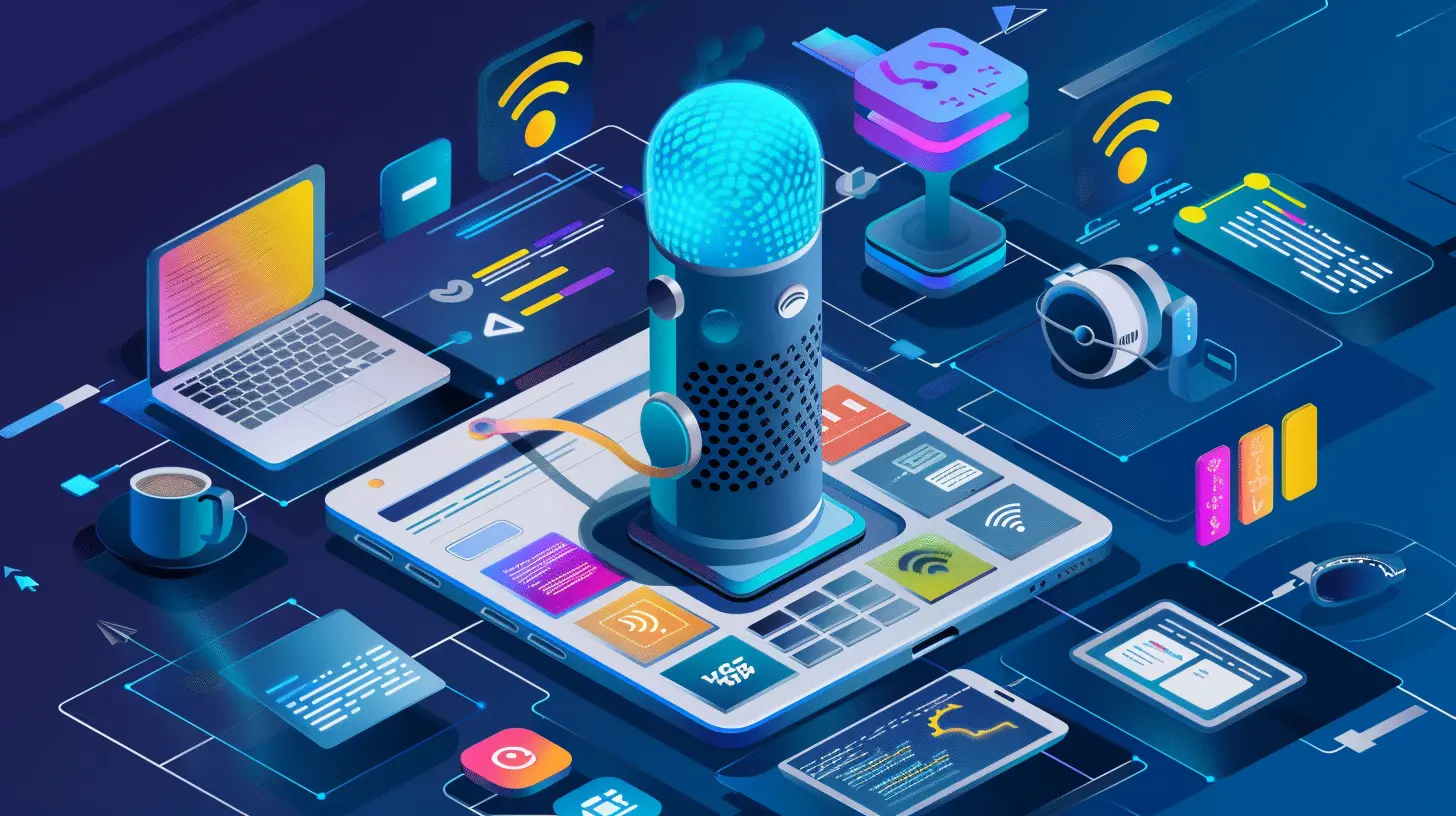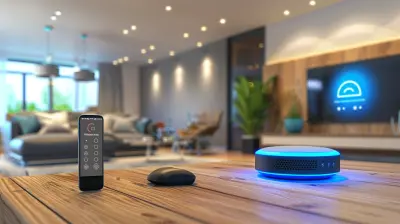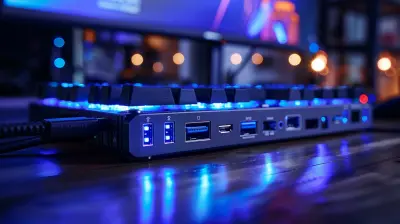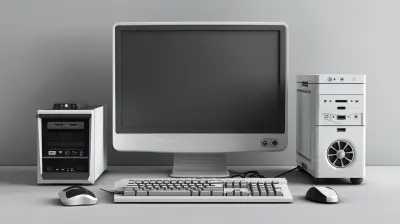The Impact of Voice Assistants on Accessibility and Inclusivity
10 December 2024
Let's be honest—voice assistants are everywhere. Whether you're asking Siri for the weather, calling out to Alexa to play your favorite song, or getting Google Assistant to set a timer, voice technology has seamlessly integrated into our everyday lives. But beyond making things more convenient for people who just don't want to type or swipe, voice assistants are creating serious waves in the world of accessibility and inclusivity.
In this article, we’ll dive into how voice assistants are empowering individuals with disabilities, breaking down barriers, and making tech more inclusive for everyone. We'll also explore some challenges that still need to be addressed. Ready? Let’s get started!
Voice Assistants: A Game-Changer for Accessibility
What Exactly Are Voice Assistants?
First things first, what are voice assistants? Think of them as your own personal digital helpers. They’re powered by artificial intelligence (AI) and natural language processing (NLP), meaning they can understand spoken commands and respond in a way that feels conversational.We’re talking about the big names here—Siri, Alexa, Google Assistant, and others. These devices can do a lot, from answering questions to controlling smart home gadgets, sending messages, making calls, and even doing your shopping. But what’s fascinating is how this tech is revolutionizing accessibility for people with disabilities.
Leveling the Playing Field for People with Disabilities
For individuals with physical disabilities, voice assistants can be nothing short of life-changing. Imagine if you couldn’t use your hands easily—how would you operate a smartphone, computer, or even a light switch? That’s where voice assistants step in.Hands-Free Navigation
Think about how much of our modern lives are controlled through our gadgets. For someone who has limited mobility or dexterity, manually operating these devices can be a significant challenge. Voice assistants remove the need for touch. Users can make calls, send texts, check emails, and even control smart home devices—all without lifting a finger.Aiding the Visually Impaired
Now, let’s talk about individuals who are blind or visually impaired. Traditional screen-based interfaces are a hurdle, but voice assistants break down that barrier. With a simple voice command, users can access information that would typically require visual input. Whether it’s listening to the news, checking the time, or navigating through apps, voice assistants offer a new level of independence.Hearing Impairment Support
You might be thinking, “But how do voice assistants help people who are deaf or hard of hearing?” That’s a fair question. While voice assistants primarily operate through spoken commands, many of them are equipped with visual feedback mechanisms. For example, Google Assistant and Alexa can display responses on compatible screens, offering text-based alternatives to verbal communication.Real-World Stories of Accessibility in Action
Let’s put this into perspective. Take the story of Ian, a man diagnosed with amyotrophic lateral sclerosis (ALS). As ALS progressed, Ian lost the ability to use his hands, but voice assistants enabled him to retain control over essential aspects of his life, including calling his family, adjusting his home’s lighting, and even writing emails.Then there’s Sarah, who is blind. Before she started using voice assistants, she had to rely heavily on others to help her surf the web, but now, with a simple "Hey Siri" or "Ok Google," she can independently look up information, send texts, and even navigate her neighborhood using voice-guided GPS.
Inclusivity: Making Tech for Everyone
The Evolution of Inclusive Technology
Inclusivity in tech isn’t just a buzzword—it’s a necessity. Voice assistants are a crucial part of the movement to make technology available and usable for everyone, regardless of their abilities. In the past, technology was designed with a one-size-fits-all mentality, alienating many individuals with disabilities. But with the rise of voice assistants, there’s been a significant shift toward designing with inclusivity in mind.It’s not just about making tech accessible, but about making it easy, intuitive, and enjoyable for everyone. Voice assistants are designed in a way that anyone—from a tech-savvy millennial to a senior citizen—can use them with ease. That’s a big win for inclusivity.
Bridging the Language Gap
One of the beautiful things about voice assistants is their ability to understand multiple languages and dialects. This feature is particularly beneficial for non-native speakers and those with speech impediments. Companies like Google and Amazon have been working hard to expand their voice assistants' language recognition abilities, making them more inclusive globally.For instance, Google Assistant supports over 30 languages, and Amazon’s Alexa isn’t far behind. This multilingual capability is a game-changer for users who might not be fluent in English or prefer to communicate in their native tongue.
Age Inclusivity: Empowering Seniors
Let’s not forget about older adults. As we age, using traditional tech—keyboards, touchscreens, and even small buttons—can become more difficult. Voice assistants serve as an intuitive interface that requires no learning curve, making tech more accessible to seniors.Picture this: Grandma is at home and wants to call her grandkids. Rather than fumbling with tiny smartphone buttons, she can simply say, “Alexa, call Emily,” and boom—she’s connected. It’s not just about convenience; it’s about making tech approachable for all generations.
The Challenges: Where Voice Assistants Still Fall Short
Understanding Accents and Dialects
Voice assistants have come a long way, but they’re not perfect. One of the ongoing challenges is accurately understanding different accents and dialects. If you don’t have a "standard" accent, you’ve probably already experienced this—you say one thing, and Siri or Alexa hears something completely different. This can be frustrating, especially for those who rely on voice assistants for accessibility.Privacy Concerns
Another big issue? Privacy. Voice assistants are always listening, and that understandably worries people. While companies like Amazon and Google claim that they only record and store commands after activation (you know, when you say "Hey Alexa" or "OK Google"), there have been cases of accidental recordings and privacy breaches. For individuals with disabilities who rely heavily on voice assistants, this can be a particularly concerning issue, as they may feel they have no choice but to sacrifice some level of privacy for convenience.Limited Contextual Understanding
While voice assistants are great at following direct commands, they still struggle with understanding context or participating in more nuanced conversations. For example, they might easily tell you the weather, but if you ask them to explain why today's temperature feels colder than yesterday’s, you might not get a coherent answer. Improving contextual understanding is crucial for making these devices even more accessible and inclusive.
The Future of Voice Assistants in Accessibility and Inclusivity
AI Advancements: More Adaptive and Intelligent
Looking ahead, the future of voice assistants is promising. With advances in AI and machine learning, we can expect voice assistants to become even more intelligent and adaptive. Imagine a future where these devices can understand not just words but also tone, emotion, and context. This would be a massive leap forward for users with cognitive disabilities or those who struggle with clear speech.Personalized Experiences
As AI continues to evolve, we can also anticipate more personalized experiences. Voice assistants will be able to learn individual preferences, habits, and even speech patterns, making them more effective for people with unique needs. For instance, someone with a speech impediment could “train” their voice assistant to better understand their specific way of speaking.Collaboration with Disability Advocates
Tech companies are increasingly collaborating with disability advocates to ensure their products are truly inclusive. This collaboration is key to developing voice assistants that not only meet accessibility standards but exceed them. The goal? To create a world where technology is not a barrier, but a bridge to independence and inclusivity.Wrapping It Up: Voice Assistants Are More Than Just a Convenience
So, what’s the bottom line? Voice assistants are much more than a nifty convenience for setting timers or playing your favorite tunes. They’re breaking down barriers, empowering individuals with disabilities, and making technology more inclusive for everyone, regardless of age, language, or physical ability.Sure, there are still challenges to overcome—like improving accent recognition and addressing privacy concerns—but the progress we’ve seen so far is nothing short of remarkable. As voice technology continues to evolve, we can expect even more exciting developments that will make the digital world more accessible and inclusive for all.
all images in this post were generated using AI tools
Category:
Voice AssistantsAuthor:

Marcus Gray
Discussion
rate this article
21 comments
Colton O'Neal
Voice assistants enhance accessibility, making technology more inclusive for everyone.
February 21, 2025 at 5:48 AM

Marcus Gray
Thank you for your comment! I completely agree—voice assistants play a crucial role in breaking down barriers and ensuring that technology is accessible to all.
Amanda Lambert
Great article! Voice assistants are truly revolutionizing accessibility, making technology more inclusive for everyone. It's inspiring to see how these innovations empower individuals with disabilities, fostering independence and enhancing everyday experiences. Excited to see what the future holds for voice technology!
February 9, 2025 at 8:21 PM

Marcus Gray
Thank you for your thoughtful comment! I'm glad you found the article enlightening. The future of voice technology indeed holds great promise for enhancing accessibility and empowering individuals.
Cassidy Elliott
Voice assistants are transforming the landscape of accessibility, empowering individuals with diverse needs. By breaking down barriers and fostering inclusivity, these technologies enable everyone to engage more fully with the digital world. Embracing these innovations paves the way for a brighter, more connected future!
January 30, 2025 at 3:48 AM

Marcus Gray
Thank you for your insightful comment! I completely agree that voice assistants play a crucial role in enhancing accessibility and inclusivity, making the digital world more navigable for everyone.
Victoria Brooks
Great article! It’s amazing how voice assistants are making technology more accessible to everyone. They truly empower those with disabilities and streamline daily tasks for all of us. Here’s to a future where tech brings us closer together!
January 23, 2025 at 12:46 PM

Marcus Gray
Thank you! I’m glad you found the article insightful. Voice assistants indeed play a crucial role in creating a more inclusive future for everyone.
Carla Love
Voice assistants: turning awkward mumblings into tech-savvy conversations since forever! Who knew our smartphones were just waiting to play therapist and life coach?
January 19, 2025 at 7:41 PM

Marcus Gray
Thank you for your comment! Voice assistants indeed bridge communication gaps, enhancing accessibility and inclusivity for many users.
Rusty McCracken
Great insights on how voice assistants enhance accessibility! It’s inspiring to see technology bridging gaps and empowering everyone. Looking forward to more discussions on inclusivity!
January 16, 2025 at 9:43 PM

Marcus Gray
Thank you! I'm glad you found the insights valuable. I look forward to continuing the conversation on inclusivity and the role of technology in making a difference.
Maris Wilkins
What a fantastic exploration of voice assistants! They truly revolutionize accessibility and inclusivity, making technology more welcoming for everyone. Excited to see how these innovations continue to empower diverse voices and enhance our daily lives!
January 13, 2025 at 8:12 PM

Marcus Gray
Thank you! I'm glad you found the exploration insightful. It's exciting to see how voice assistants continue to transform accessibility and inclusivity for all.
Sophie Wheeler
What a fantastic read! Voice assistants are truly revolutionizing accessibility and inclusivity, making technology more welcoming for everyone. It's inspiring to see how these innovations empower individuals and enhance their daily lives. Cheers to a future where everyone can effortlessly engage with technology! 🎉✨
January 9, 2025 at 6:03 AM

Marcus Gray
Thank you for your thoughtful comment! I'm glad you enjoyed the article and share the excitement about the positive impact of voice assistants on accessibility and inclusivity. Here's to a more inclusive tech future! 🎉
Zevran McCool
Voice assistants significantly enhance accessibility and inclusivity for individuals with disabilities. By enabling hands-free interaction and providing voice-controlled functionalities, they bridge communication gaps and empower users. As technology evolves, ongoing improvements in voice recognition and natural language processing will further extend these benefits, fostering a more inclusive digital landscape.
January 5, 2025 at 4:09 AM

Marcus Gray
Thank you for your insightful comment! I completely agree that voice assistants play a crucial role in enhancing accessibility and inclusivity, and their continued evolution will further empower individuals with disabilities.
Drake McMaster
Great read! Voice assistants are truly revolutionizing accessibility. Their ability to empower diverse users, from the elderly to those with disabilities, showcases the importance of inclusive tech. Excited to see how this evolves further!
December 28, 2024 at 12:38 PM

Marcus Gray
Thank you! I completely agree—voice assistants are game changers for accessibility, and it's inspiring to see their potential for inclusivity grow.
Chelsea Benton
This article highlights an important aspect of voice assistants, showcasing their potential to enhance accessibility for individuals with disabilities. However, it’s crucial to recognize the limitations and challenges that still exist, such as regional language support and the need for continuous improvement in AI understanding to truly foster inclusivity.
December 22, 2024 at 1:56 PM

Marcus Gray
Thank you for your insightful comment! I completely agree that while voice assistants hold great promise for accessibility, we must address the challenges like regional language support and AI comprehension to ensure true inclusivity. Your feedback is invaluable!
Caelum Jones
Great insights! Voice assistants really do make tech more accessible for everyone!
December 18, 2024 at 10:02 PM

Marcus Gray
Thank you! I'm glad you found it insightful. Voice assistants indeed play a crucial role in enhancing accessibility for all users.
Gianna Whitley
This article highlights the transformative role of voice assistants in enhancing accessibility and inclusivity. By breaking down barriers, these technologies empower users with diverse needs, fostering greater independence and connectivity.
December 15, 2024 at 9:11 PM

Marcus Gray
Thank you for your insightful comment! I'm glad you found the article highlights the significant impact voice assistants have on enhancing accessibility and inclusivity.
Kendall Pace
This article beautifully highlights how voice assistants are revolutionizing accessibility for so many. It's amazing to think about how simple voice commands can empower individuals, making technology more inclusive. As someone who relies on these tools daily, I appreciate the strides being made toward a more accessible future for everyone!
December 15, 2024 at 12:09 PM

Marcus Gray
Thank you for your thoughtful comment! I'm glad to hear that voice assistants are making a positive impact on your daily life and contributing to a more inclusive future.
Zephira McNulty
Voice assistants significantly enhance accessibility by empowering individuals with disabilities, facilitating greater independence. Their adaptability fosters inclusivity, bridging communication gaps, but ongoing development is essential to address diverse user needs effectively.
December 15, 2024 at 3:56 AM

Marcus Gray
Thank you for your insightful comment! I completely agree that voice assistants play a crucial role in enhancing accessibility and inclusivity for individuals with disabilities. Ongoing improvements are indeed vital to meet diverse user needs.
Raina Shaffer
Voice assistants empower individuals, breaking barriers to accessibility and inclusivity.
December 14, 2024 at 9:05 PM

Marcus Gray
Thank you for highlighting this! Voice assistants truly play a crucial role in enhancing accessibility, fostering inclusivity, and enabling individuals to engage more fully with technology and their environments.
Flora McMahan
Great article! Voice assistants are truly transforming accessibility and inclusivity, making technology more user-friendly for everyone. Excited to see how they continue to evolve and empower users!
December 14, 2024 at 1:55 PM

Marcus Gray
Thank you! I'm glad you found the article insightful. It's exciting to witness the positive changes voice assistants are bringing to accessibility and inclusivity.
Russell McMeekin
Great article! Voice assistants are truly game-changers, making technology more accessible for everyone. It's inspiring to see how these innovations empower diverse communities and enhance inclusivity. Here’s to a more connected and accessible future!
December 14, 2024 at 5:32 AM

Marcus Gray
Thank you for your thoughtful feedback! I'm glad you found the article inspiring. Here's to continued advancements in accessibility and inclusivity!
Devin Davis
Great insights! Voice assistants are truly transforming accessibility, making tech more inclusive for everyone.
December 13, 2024 at 3:36 AM

Marcus Gray
Thank you! I'm glad you found the insights valuable. Voice assistants are indeed pivotal in enhancing accessibility and fostering inclusivity in technology.
Linnea Adams
This article beautifully highlights how voice assistants are transforming accessibility and inclusivity. It's inspiring to see technology bridging gaps and empowering individuals. Let's continue advocating for innovations that uplift everyone in our diverse society. Great read!
December 12, 2024 at 2:00 PM

Marcus Gray
Thank you for your thoughtful comment! I’m glad you found the article inspiring. Together, we can continue to advocate for advancements that promote accessibility for all!
Monique Smith
Voice assistants significantly enhance accessibility, breaking barriers for disabled individuals. However, ongoing improvements are needed to ensure inclusivity for all users.
December 11, 2024 at 4:46 AM

Marcus Gray
Thank you for your insights! I completely agree—while voice assistants have made great strides in enhancing accessibility, continuous improvements are essential to ensure they serve all users effectively.
MORE POSTS

The Evolution of Motherboard Technology: What’s New on the Horizon

Understanding the Differences Between SATA, NVMe, and M.2 Drives

Electric Bicycles: A Solution for Eco-Friendly Commuting

How Robots Are Enhancing Supply Chain Efficiency

Camera Stabilizers Explained: Gimbals, Tripods, and More

Gadgets That Are Making Smart Homes Smarter

The Most Innovative Gadgets for a Connected Lifestyle

Data Breaches: How They Happen and What You Can Do

How Cloud Computing is Enabling Digital Transformation in Finance

Why DisplayPort Is Becoming the Standard for High-Resolution Monitors

Building a Silent PC: Tips for Noise-Free Computing

The Future of Web Development: How WebAssembly is Changing the Game

The Most Versatile Lenses for Street Photography